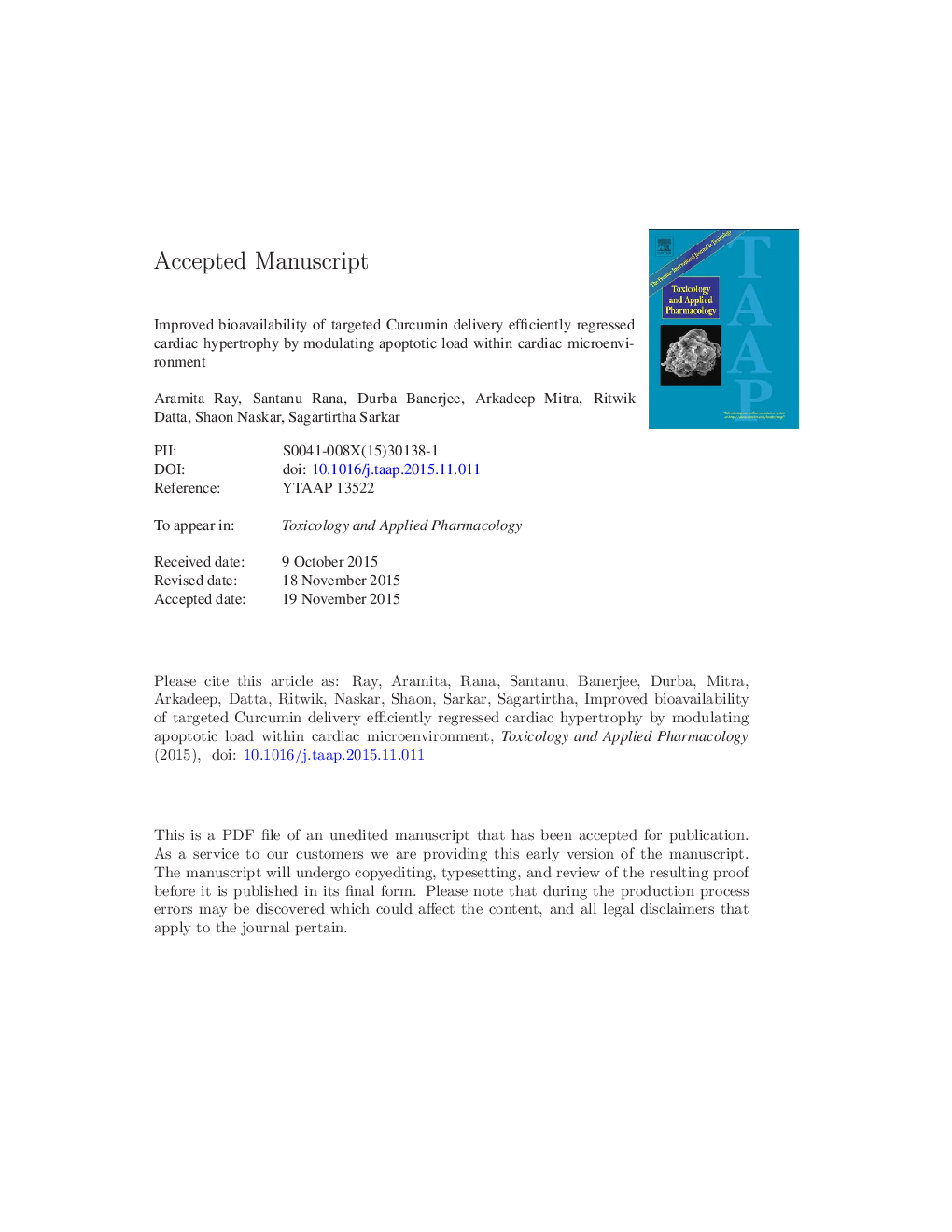| Article ID | Journal | Published Year | Pages | File Type |
|---|---|---|---|---|
| 5845893 | Toxicology and Applied Pharmacology | 2016 | 35 Pages |
Abstract
Cardiomyocyte apoptosis acts as a prime modulator of cardiac hypertrophy leading to heart failure, a major cause of human mortality worldwide. Recent therapeutic interventions have focussed on translational applications of diverse pharmaceutical regimes among which, Curcumin (from Curcuma longa) is known to have an anti-hypertrophic potential but with limited pharmacological efficacies due to low aqueous solubility and poor bioavailability. In this study, Curcumin encapsulated by carboxymethyl chitosan (CMC) nanoparticle conjugated to a myocyte specific homing peptide was successfully delivered in bioactive form to pathological myocardium for effective regression of cardiac hypertrophy in a rat (Rattus norvegicus) model. Targeted nanotization showed higher cardiac bioavailability of Curcumin at a low dose of 5 mg/kg body weight compared to free Curcumin at 35 mg/kg body weight. Moreover, Curcumin/CMC-peptide treatment during hypertrophy significantly improved cardiac function by downregulating expression of hypertrophy marker genes (ANF, β-MHC), apoptotic mediators (Bax, Cytochrome-c) and activity of apoptotic markers (Caspase 3 and PARP); whereas free Curcumin in much higher dose showed minimal improvement during compromised cardiac function. Targeted Curcumin treatment significantly lowered p53 expression and activation in diseased myocardium via inhibited interaction of p53 with p300-HAT. Thus attenuated acetylation of p53 facilitated p53 ubiquitination and reduced the apoptotic load in hypertrophied cardiomyocytes; thereby limiting cardiomyocytes' need to enter the regeneration cycle during hypertrophy. This study elucidates for the first time an efficient targeted delivery regimen for Curcumin and also attributes towards probable mechanistic insight into its therapeutic potential as a cardio-protective agent for regression of cardiac hypertrophy.
Keywords
NHSβMHCbeta myosin heavy chainANGIIPARPBcl2ANFN-hydroxysuccinimidep-p53di-tert-butyl dicarbonatePCNArpl32COX IVEDCCMCBoc2O1-ethyl-3-(3-dimethylaminopropyl) carbodiimideProliferating Cell Nuclear AntigenCardiomyocyte apoptosisconBaxTerminal deoxynucleotidyl transferase dUTP nick end labelingTUNELControl cellsatrial natriuretic factorB-cell lymphoma 2Cardiac hypertrophybody weightHeart weightBcl-2-associated X proteinpoly ADP ribose polymeraseCarboxymethyl chitosanPositive controlnegative controlCurcumin
Related Topics
Life Sciences
Environmental Science
Health, Toxicology and Mutagenesis
Authors
Aramita Ray, Santanu Rana, Durba Banerjee, Arkadeep Mitra, Ritwik Datta, Shaon Naskar, Sagartirtha Sarkar,
